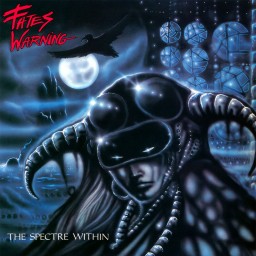 Review by Mike Morphett for Fates Warning - The Spectre Within (1985)
Review by Mike Morphett for Fates Warning - The Spectre Within (1985)
The second album from Fates Warning was a big step forward, and began to establish their own sound. The production, while dated these days, is a big improvement on their debut, and there is a satisfying organic warmth to the rhythm guitars. Jim Matheos is clearly stretching his songwriting wings here, exploring trickier time signatures and arrangements; the roots of their progressive leanings are here, but this is still very much a traditional/power US metal record. In that milieu, the lead guitars are not quite at their peak yet, but this would be Victor Arduini’s last record with the band. John’s vocals are strong and impassioned, diving up and down his range, in a unique combination of Bruce Dickinson’s tone and Geoff Tate’s register. The songs are mostly strong, but there is still some weaker NWOBHM-inspired fare filling the gaps and stops the album being a killer from start to finish.
The more challenging arrangements kick off almost immediately with opener “Traveler In Time”, which chugs along at a metal mid-pace, with occasional Uriah Heep-like interludes, and has a soaring chorus melody. However, it suffers a common issue to some of the tracks on this album, which is that it spends much of it’s close to 8 minute duration being held in check in tempo - the songs feels like it wants to take off at a gallop at times, but when it fails to do so it feels a little anti-climactic. Things do pick up to a more frenetic pace in places (“Orphan Gypsy”, “Without A Trace”), but other tracks (“The Apparition”) feel like they’re being held back a little. The choruses are some true standout moments of the album, featuring strong yet unpredictable melodies and rich harmonies (“Without A Trace”, “The Apparition”), which make the songs on this album quite memorable, much more so than those on it’s predecessor, and hinting at what was to come on it’s successor.
The album closes strongly, “The Apparition” and “Kyrie Eleison” being two of the tracks that really stand out in the Fates catalogue, and encapsulate this stage in the band’s development from derivative youngsters to influential champions of a new genre. It is somewhat overshadowed by its successor, but has stood the test of time and is a pleasure return to for repeated listens, especially after a long absence when you realise how many of those choruses you remember.
